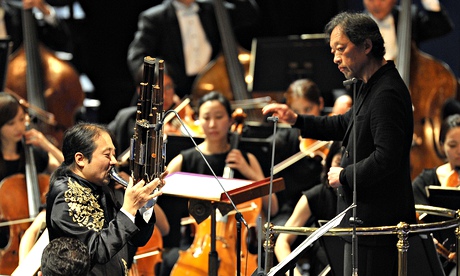
It's not often that a western-style concerto for a non-western instrument works as well as Šu, written by the South Korean composer Unsuk Chin for the Chinese sheng player Wu Wei. This was the highlight of the Seoul Philharmonic's debut Prom, under Myung-Whun Chung.
The sheng is a kind of ancient Chinese mouth-organ. Visually, it's a foot-high nest of upward-striving tubes – imagine someone tore off a corner off the Sagrada Familia and stuck in a mouthpiece. It sounds like a harmonica – but also, when played with Wu's virtuosity, like almost any other instrument too. It emerges seamlessly from the violins, traces long arcs of reedy breath like a clarinet, tremolos like a mandolin, or makes sudden, percussive mini-explosions. In Chin's concerto, which holds the serious and the playful in fabulous balance, we can barely tell where the sheng stops and the orchestra begins. The music hangs in the air, or dances in a frenzy, but all the time it seems the other instruments are tracing the aura the sheng leaves in its wake.
At the end, the sheng was echoed by strings playing from a box on the far side of the hall, and as their pulsing lost speed it felt as though the sound waves themselves were slowing down. Wu played brilliantly, as he did in his encore, his own Dragon Dance, which began with an ecclesiastical chant and sounded at times like a bonkers organ voluntary.
Framing the Chin was Debussy's La Mer, conjuring ocean swell more than surface glitter, and Tchaikovsky's Pathéthique Symphony. The latter was solid but not particularly stylish until the third movement, which had a tightly wound momentum. Chung decided to stop and acknowledge the applause afterwards, which made the fourth movement seem initially almost like an encore. Still, the orchestra had saved up some of its most beautiful playing, enough to salvage part of the movement's tragic impact. And the encore, Brahms's Hungarian Dance No 1, had style and guts.
• On BBC iPlayer for 30 days. The Proms continue until 13 September.

